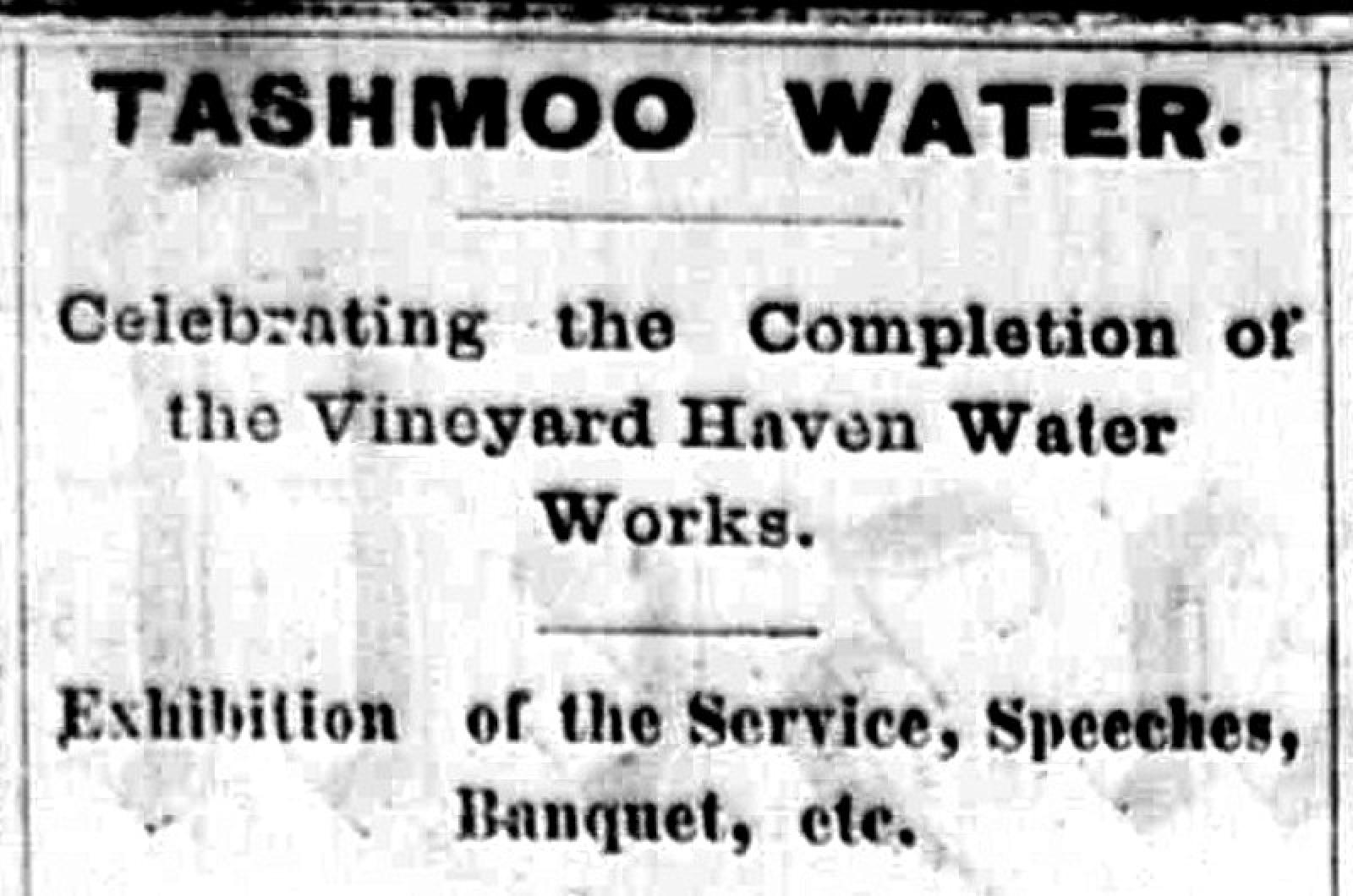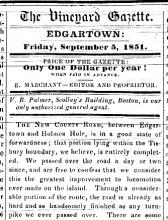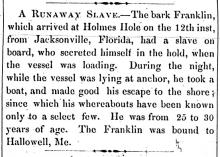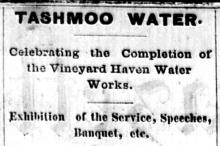Vineyard Haven, Dec. 15. - Today has been a red letter day in the history of Vineyard Haven. The water works, the progress of which has awakened so much interest throughout the island, has been formally opened and the consummation of the enterprise celebrated in a manner commensurate with its importance. Vineyard Haven has a right to be proud, not only of its water system, but of the brilliant demonstration which signalized its completion, and of the creditable manner in which her citizens arose to a proper recognition of the occasion.
Early in the day the village began to put on its gala attire, and liberal displays of bunting by Luce Brothers - who threw out the whole international code of signals - R. W. Crocker, the Mansion House, Capt., L. C. Owen and Mr. E. H. Manter, gave to the streets an unwontedly festive appearance. The exhibition of the water service took place at 3 o’clock as per appointment, though a steady rain somewhat interfered with the comfort of the spectators. The exhibition was entirely successful, however, and the two pipes attached to the hydrant opposite Crocker’s factory threw water over the tops of all the buildings in the vicinity with only the pressure of the standpipe. The popular interest, however, centered about the evening exercises, which took place exactly according to programme, and passed off without a single miscarriage to mar the completeness of the celebration.
At 6.30 Association Hall was filled with an expectant company assembled to listen to a musical programme and a series of addresses by favorite sons and distinguished visitors. Lieut.-Governor Bracket occupied a central position upon the platform, flanked by Messrs. Wm. Minot, Alex S. Porter, R. S. Whitney, F. B. Beaumont, W. B. Owen and M. A. Bates, all of Boston and members of the V. H. Land and Water Company (or companies), Messrs. O. G. Stanley, Henry Castello and Geo. W. Walker, resident officers and attaches of the same, while grouped about the platform were Messrs. N. H. Peakes (chairman) H. H. Smith (secretary) R. W. Crocker, Stephen C. Luce, Capt. G. L. Smith and Dr. W. Butler, of the citizens executive committee, county commissioner B. B. Smith, sundry other gentlemen from out of town, and the wives of more or less of the gentlemen above named. The addresses by the three young members of the bar - all Vineyard Haven born and bred - were a credit to their authors and to the community that produced them, and it is to be regretted that insufficient space forbids a verbatim report of each. The musical selections were charmingly rendered, the voices in the trio blending in wonderful harmony, and the solo (to which there was an encore) displaying the rare sweetness of Mrs. Strahan’s voice and her fine command of the upper register to marked advantage. Mrs. Shugrue presided at the organ, and Church’s orchestra of New Bedford furnished the orchestration. Mr. S. C. Luce was master of ceremonies.
PROGRAMME.
1. MUSIC, ORCHESTRA.
2. SPEECH, W. A. Merse.
3. SPEECH, W. B. Owen.
4. TRIO, “Believe Me” Verdi; Mrs. Strahan, Messers. H. J. Cleveland and C. F. Chadwick.
5. SPEECH, C. H. Brown.
6. SPEECH, Wm. Minot.
7. MUSIC, “Camelia.”
8. SOLO, Mrs. Strahan,
9. SPEECH, Lieut. Gov. Brackett.
Wm. A. Morse, Esq., now of Boston, gave the address of greeting. He opened his speech by remarking that he had often wondered as a boy how it would seem to stand on that platform and address an assemblage of his neighbors, but he felt now that if he lived to get back to his seat in the audience he should have no further curiosity in that direction. The speaker was of the opinion that the old oaken bucket was a good think to write poetry about, but judging by his own recollection and experience it was a mighty unhandy way to get water, especially when the well was a good ways from the house. Mr. Morse then eulogized the Water Company for their enterprising spirit, and congratulated the people on the completion of the great work from which they were to derive such incalculable benefits.
W. B. Owen, Esq., now of Boston, spoke for the Water Company. After dwelling at some length on the growth and greatness of the country, the speaker observed that the history of the civilization of every country was the history of its water systems, and illustrated his point by allusions to the systems of several countries which he named, concluding with a running sketch of the water facilities in Vineyard Haven from a hundred years ago down to now.
C. H. Brown, Esq., also now of Boston, was the next speaker, and announced that he had been chosen to speak for the Tashmoo spring. Every spring and brook was supposed to have a nymph or a naiad who presided over its destinies and sang its praises, but he had cudgeled his brains in vain to see how he could convert himself into either. Without going into the nymph or naiad business very much, however, Mr. Brown succeeded in ingeniously appropriating a lot of very interesting Norse discovery and adventure for Tashmoo and its vicinity, and recited some extract from Icelandie sagas which undoubtedly related to that identical spring, and altogether succeeded in weaving a very pretty web of romance about the Island. The speaker closed with a modest expression of regret that the native-born speakers of the evening had not been older men, whose gray hairs and experience would warrant their giving advice; and then, protesting that he should not feel that he had done his duty if he failed to say what was in his heart, submitted to his former townsmen some suggestions that might well influence their conduct in their intercourse with the summer visitor, which should enable the latter to see the best phase of native New England life.
Mr. Wm. Minot, of Boston, treasurer of the Land Company, was gratified to perceive how much the gentlemen who had already spoken know about water, illustrated the hold which the idea of growth has even on the very young by instancing the case of his little girl who wanted to know if when she grew up the calves of her legs would be cows, and expressed his gratification at the evident appreciation of the Company’s efforts. Mr. O. G. Stanley was, however the man to whom the credit for this enterprise was due above all others, and the speaker closed by inviting that gentleman to come forward.
Before Mr. Stanley could get into position at the front of the platform, however, he was waylaid by Mr. Luce, who on behalf of the citizens of Vineyard Haven presented him with a handsome gold watch and chain, properly inscribed, as a token of their regard. Mr. Stanley was evidently unprepared for this assault, but recovering himself quickly made due acknowledgment, and expressed his own satisfaction with the way in which the new enterprise was regarded by the people.
Lieut.-Governor Brackett - who was greeted with loud and long continued applause - was the last speaker, and he said he brought the greeting of the Commonwealth, which was always interested in the well-being of its constitute parts. He told in brief the story of the circumstances under which the poem of the “Old Oken Bucket,” to which reference had been made, was written, gave an account of the rise and development of the Boston water system, hoped the people of Vineyard Haven would avail themselves of the benefits now offered, and thanked the audience for their kind attention and the warmth of their reception.
The closed the speech-making at Association Hall, and after music and a recess of an hour an adjournment of all holders of tickets was had to Capawock Hall, where the banquet had been prepared. The interior of this latter hall presented a most attractive appearance. The ceiling and walls were profusely festooned and hung with bunting and Chinese and Japanese lanterns in every conceivable fashion, and the half-dozen long tables with their snowy linen and burden of good things, running the entire length of the hall, added not a little to the inspiring effect. A table on the platform at the end of the hall accommodated the lieutenant-governor, Mr. and Mrs. N. H. Peakes, Rev D. W. Stevens, Mrs. Thankful Smith, Dr. Butler, Mrs. Ottiwell, Mr. and Mrs. S. C. Luce, the members of the Water Company, and perhaps others overlooked by the writer. Mr. Peakes performed the duties of toastmaster in his immitable way, and called the toasts and introduced the speakers with characteristic comments. There were about 250 at the tables.
The boned turkey, scalloped oysters, lobster salad, cake, coffee and ice cream have been duly discussed, the first toast was announced. “Our Visitors,” responded to by Rev. D. W. Stevens in a speech bristling with good points, and closing with an adroit allusion to Mr. Brackett as the future head of the government.
“The Old Bay State” called up the last named gentleman, who recognized the sentiments of patriotic loyalty and regard indicated in the toast. He explained the unavoidable absence of Governor Ames, and announced himself the bearer of his regrets. He said owing to the lateness of the hour he would try and follow the advice of the small boy in the audience who hearing a speaker make the inquiry what should he talk about, piped out the suggestion that he talk about a minute; and brought his remarks to a close with a word of emphatic praise for the promptness with which the Water Co. had performed their contract - the Legislature having allowed two years and the company having occupied eight months.
The toast “The Land Company” brought out a brief but bright response from Mr. Minot, and “The Water Co.” a more lengthy recognition from Mr. Porter, full of mirth producing points.
Mr. Keniston of the Gazette responded for “The Press,” and spoke for minutes and fifty-eight seconds by the clock.
Mr. C. H. Brown responded for “The Bar,” with brief allusions to successful Vineyard lawyers of a former generation - Leavitt Thaxter of Edgartown, Charles G. Thomas afterward of Boston, Judge Spaulding who settled in the west.
“Tashmoo spring water” was responded to in a song with words written for the occasion, by Mr. H. J. Cleveland.
“Our public schools” called up Rev. Mr. Grant, who although he complained of having become so saturated with water that he felt “all at sea,” had evidently no water on the brain, and made a very felicitous speech, with some analogies which he left his hearers to apply.
To the toast “Pequot Lodge” the “Great P. D. Z.” was called for but failed to respond, and the toastmaster explained that he’d probably gone weequashing.
“The Daughters of Martha’s Vineyard” brought out Mr. Wm. A. Morse, who made a humorous speech eliciting much applause.
“Our Island Home” was responded to be Rev. J. E. Hamilton, who protested against being called up after 12 o’clock to toast the whole island, and then went on and made one of the best speeches of the evening.
Mr. John N. Pierce answered for “Our sister towns,” and indulged in a little good-natured sarcasm on the unity and oneness of mind which had always characterized the sisterhood. Mr. Pierce also reminded his hearers that something has been done in other parts of the island before the advent of the Water Company, and was glad to see the boom which commenced in the township of Edgartown 20 or 30 years ago, had now reached Vineyard Haven.
“Holmes Hole - though lost to sight to memory dear,” received the personal attention of Mr. I. N. Luce, who remarked that “Holmes Hole” died 20 or 30 years ago, “a victim to modern refinement.” Mr. Luce then indulged in some interesting reminiscences, and also called attention to the fact that Martha’s Vineyard had never had a native-born citizen in state prison, though entitled to have two there all the time, and that people live twice as long in Dukes as in Suffolk,
Mr. Charles Strahan answered to “The Martha’s Vineyard Club,” pointing out its usefulness, and emphasizing the broad scope of its operations and its desires.
In response to the toast “Tashmoo” Mrs. - Claghorn read an original poetic legend.
“The Sons of Martha’s Vineyard” elicited a letter from that organization which was read by Mr. Benjamin Clough, jr.
Mr. Owen, speaking for “The Future of Vineyard Haven,” drew a rose-colored picture of the time when everything on the island worth having should have been absorbed by that village.
The last toast, “The event we celebrate - long expected, come at last,” was responded to by Mr. Stanley, who - consulting his new watch - found that it was the next morning, and so contented himself with a brief practical speech, pointing the lesson of the event, and especially emphasizing the idea that no matter how many natural advantages a locality may have, it must be brought to the public’s knowledge before the public will give it much attention.
A promenade concert closed one of the most successful celebrations ever known on the Vineyard.











Comments